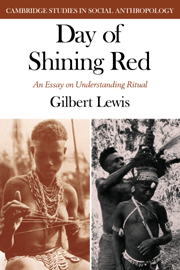Book contents
- Frontmatter
- Contents
- Analytical table of contents
- Preface
- 1 A question of interpretation
- 2 Problems of ritual in general
- 3 Views from one village
- 4 The rites of puberty seen
- 5 Rules of procedure and reflection on them
- 6 Silent forms but natural symbols?
- 7 Moon, river and other themes compared
- 8 For success in life
- 9 A choice of magic
- 10 Change and a rite falling into disuse
- 11 Inventory of themes
- References
- Index
- CAMBRIDGE STUDIES IN SOCIAL ANTHROPOLOGY
10 - Change and a rite falling into disuse
Published online by Cambridge University Press: 30 October 2009
- Frontmatter
- Contents
- Analytical table of contents
- Preface
- 1 A question of interpretation
- 2 Problems of ritual in general
- 3 Views from one village
- 4 The rites of puberty seen
- 5 Rules of procedure and reflection on them
- 6 Silent forms but natural symbols?
- 7 Moon, river and other themes compared
- 8 For success in life
- 9 A choice of magic
- 10 Change and a rite falling into disuse
- 11 Inventory of themes
- References
- Index
- CAMBRIDGE STUDIES IN SOCIAL ANTHROPOLOGY
Summary
The people at Rauit and other Gnau villages continue to perform the rites of puberty for all their children but they do not do them exactly as their fathers used to. They know this. The question which I shall consider is why they have changed them.
Their social world was entered by strangers not much more than two generations ago. The old men in the village remember when first they saw some ‘Malay’ hunters after birds of paradise who travelled south of the village but did not come into it: they came from the west (from Dutch New Guinea, as it then was). They carried guns and showed the Gnau salt (the Gnau mistook it for their semen – bulp∂g), matches and tin plates which, to the Gnau, shone like the moon and they called them g∂'unit belgap ‘fingernails of the moon’. Between that time and my most recent visit in 1975, with Papua New Guinea become an independent country and villagers discussing whether to try to join together to buy a truck when the road comes, much change has invaded the general character of their lives. It has extended the scope of the social world in which they live.
The knowledge and experience of their fathers no longer provide sufficient basis and training to face the present and the future. Between what they need to know now and the culture of their fathers lie changes produced by events from outside, for reasons they have no full means to understand.
- Type
- Chapter
- Information
- Day of Shining Red , pp. 200 - 215Publisher: Cambridge University PressPrint publication year: 1980



